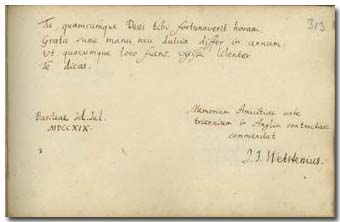
Tu, quamcumque Deus tibi fortunaverit horam,
Grata sume manu, neu dulcia differ in annum:
Ut, quocumque loco fueris, vixisse libenter
Te dicas. *
Memoriam Amicitiae ante triennium in
Anglia contractae commendat
J. J. Wetstenius
Basileae Id. Jul. MDCCXIX.
|
* Horace, Epistulae 1.11.22-25.
|
|
|
Whichever hour of yours is blessed by God with happiness, / accept
it with grateful hands, do not defer for the future that is sweet /
in order you could tell at the end that / you have lived with joy. *
I recommend into your memory our friendship
made in England three years ago
J. J. Wetstein
In Basel, at the Idus of July of 1719.
|
p. 313. Basel, July 15, 1719
Wettstein, Johann Jakob
(1693-1754), Swiss Reformed
theologian, orientalist
Johann Jakob Wettstein (Wetstein) was born in Basel on March 5, 1693,
the second son (out of thirteen) of the erudite pastor of the St.
Leonard Johann Rudolf Wettstein, and of Sara Sarafin, the
grand-grandson of the renowned Mayor of Basel, Johann Rudolf W.
(1594-1666). In 1706, at the age of 13 he was already admitted to
the academy of Basel, and in 1708 he received the first award for
his lecture Bonis omnia in bonum cedere. In 1709 he
graduated M.A. of philosophy. Then he read theology with the
renowned professors Johann Ludwig Frey (1682-1759), Jakob Christoph Iselin
(1681-1737), Samuel Werenfels (1657-1740) and his relative Johann
Rudolf Wettstein (1647-1711), grandson of the above mentioned
Mayor, thus cousin of the father of our Johann Jakob. In 1713 he
became a candidate pastor. He studied Hebrew and Syriac, the
Talmud and the ancient sources, translated Greek ecclesiastical
and secular authors. In 1714 he went to visit the academies of
Zürich, Bern, Geneva, Lyon, Paris and England. He made
acquaintance with many renowned scholars, in Cambridge for example
with Richard Bentley (1662-1742), who encouraged him to study the
Syriac codex of St. Ephraim in Paris. In 1717 he became "diaconus
communis" (assistant pastor) in Basel, then diacone of the St.
Leonard until 1730, thus colleague and successor of his father. In
the meantime he pursued textual criticism, and planned to publish
a new edition of the New Testament. In 1729 however he was accused
of heterodoxy as well as with Socinian and Arian sympathies; he
was obliged to revoke the manuscript of his Bible edition, and in
1730 he was dismissed from his office of diacone. Then he went to
his relative and publisher in Amsterdam, the bookseller Wettstein,
where in 1731 he was appointed professor of philosophy, a
successor of the old and ill Johannes Clericus (1657-1736).
However, attack from his home town reached him also here, and he
had to document and confirm his beliefs in writing to the
Dreizehnherren ("the Thirteen", the highest authorities of the
canton of Basel). Later he was invited to Basel, but he refused to
go, and remained in Amsterdam, where the Remonstrants confirmed
him in his position. In 1751-52 he published the chef-d'oeuvre of
his life, the edition of the Greek New Testament with rich
commentaries. From 1752 he was the member of the Prussian Academy
of Sciences, and from 1753 of the Royal Society of London. He was
never married. He died on March 23, 1754 in Amsterdam. His
biographer Karl Rudolf Hagenbach (1860) called him "martyr of the
incipient Illumination". His main works: Dissertatio de variis Novi Testamenti
lectionibus, Basel, 1713. – Prolegomena ad Novi Testamenti
Graeci editionem accuratissimam … Amsterdam, 1730. –
Declaratio Senatui Basiliensi exhibita d. 22. Decmb. 1731.
[Sine loco], 1732. – He Kaine diatheke: Novum Testamentum
Graecum … Amsterdam, 1751. 2 tom. – Duae epistolae S.
Clementis Romani, discipuli Petri Apostoli, quas ex codice
manuscripto Novi Testamenti Syriaci nunc primum erutas, cum
versione Latina apposita. Leiden, 1752.
•
ADB • Meusel • Michaud |